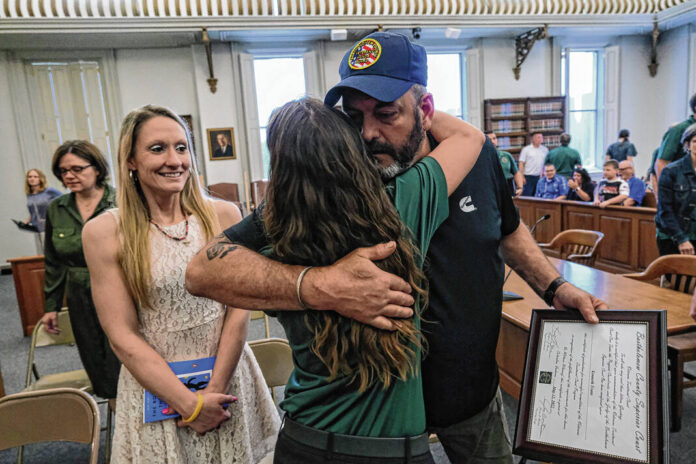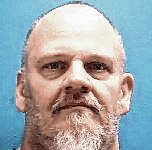
Mike Wolanin | The Republic U.S. Army veteran Angela Halberstadt, left, and U.S. Army veteran Kenneth Evans, right, are congratulated by Stacey Harry, Veterans Treatment Court case manager, during a graduation ceremony for the Bartholomew County Veterans Treatment Court in Superior Court 1 at the Bartholomew County Courthouse in Columbus, Ind., Thursday, May 12, 2022.
A group of local veterans were honored for completing the Veterans Treatment Court program and their work to change their lives and create new opportunities for the future.
Bartholomew Superior Court 1 Judge James Worton, who oversees the local program, said if there was anyone who deserved a second chance through the Veterans Court program, “it’s those who signed their name to a blank check that could include giving their lives,” as part of defending their country.
He was speaking to more than 65 people who packed his courtroom Thursday as eight veterans advanced from facing criminal charges to receiving a standing ovation for successfully completing the program.
Due to work and other conflicts, only three of the eight graduates attended the ceremony: Kenneth Evans, Joshua Shabee and Angela Halberstadt. All but one of the eight had been in combat, finding themselves adversely affected by long-term physical and mental conditions, Bartholomew County Chief Probation Officer and former U.S. Marine Brad Barnes said.
Most graduates of the program have suffered from post-traumatic stress, brain trauma, anxiety, depression, chemical dependency, unemployment or homelessness, Worton said.
While the majority of participants take 18 months to complete the program, some finish in as little as 15 months, Barnes said.
But while enjoying cake at Thursday’s reception, the graduates agreed the program was certainly no cakewalk.
The Veteran’s Court program includes five “levels” that must be completed to graduate. Each level includes stringent requirements for drug screenings, court visits and meeting with case managers.
Requirements are often far stricter than those demanded of individuals within the criminal justice system, the judge said. In fact, the program can be so intense and demanding that participants from Decatur, Jennings, Jackson, Brown and Bartholomew counties have been kicked out for their inability to comply, one program mentor said.
It can also be tough getting in the program, Worton said. Veterans charged with major felonies, serious violent offenses or sexual offenses, as well as those who had a criminal history prior to their enlistment, are not accepted.
The eight who successfully completed the program did so because they were seeking to erase mistakes of their past, Worton said.
As keynote speaker, retired U.S. Air Force pilot Maj. Travis Walton talked about his own mistakes during and following his military service.
Walton, a 22-year veteran who is now a minister and civilian airline pilot, talked about his experience of living with a traumatic brain injury for 20 years without knowing it. While Walton is heavily decorated, he said he spent years in therapy.
“Trauma is a fact of life, and we all have missteps,” Walton told the graduates. “It’s how you recover from those. It’s about healing the mind. It’s about accepting who you are.”
Worton added that an essential element of self-improvement is support from others.
Sgt. Maj. Rick Caldwell of the American Veterans (AMVETS) organization said different veterans with trauma issues need different forms and levels of support.
Some need attention, affection or acceptance, while others need a combination of all three, Caldwell said.
But if they fulfill the program’s requirements, the veteran may be able to expunge convictions from their record as well as receive housing and employment assistance.
As the formal event was about to break, Worton gave some final words of encouragement that resulted in more than a few damp eyes in the courtroom.
“Be proud of yourselves today,” Worton said. “This is a day for celebration. A day for you to be proud of an incredible accomplishment. We are very proud of you. You inspired us in so many ways that it’s difficult to be put into words.”
Since only a very small number of people are accepted into the program at any given time, there have only been 37 graduates of Veterans Treatment Court since it began in Bartholomew County in 2016, Barnes said.
But the program boasts a 75.8% retention rate of participants, he added. In addition, Barnes said 83% of those who successfully complete the program do not commit further crimes.




